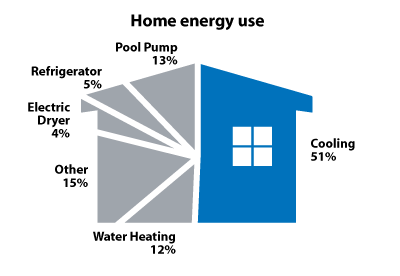This is a common and legitimate question for people considering moving to the Phoenix area. After all, it’s awfully hot for several months of the year. Is cooling your home more costly than heating it through a Chicago winter?
The enormous number of variables associated with utility costs make generalizing impossible. Even if you were to have the exact square footage home as someone else in the area, your bills may not be comparable. Be aware, though, that just some of the variables that come to mind are:

Electric Bills Can Vary With…
- Location of home
- Size of home
- Type of home-detached single family, townhouse, semi-detached, apartment/condo/loft, multifamily, manufactured home, mobile home
- Age of home
- Type of construction
- Type of insulation
- Type of roof
- Number of rooms and their size
- Exposure (amount of afternoon sun)
- Use of ceiling fans
- Types of window treatments
- Number of people and ages of people living in house
- Number of pets in the house in the summer
- Presence of central air conditioning
- Number of A/C units are there
- Presence of evaporative cooling or Window AC units
- Age of air conditioner or heat pump
- Type and size of water heater
- Presence of an attic
- Presence of a basement
- Presence of a pool and/or spa
- Size of the pool motor and how often it runs
- Thermostat settings
- The degree to which the home’s occupants conserve energy
Now that you agree how difficult it is to estimate what someone’s electric bills will be when they move to the greater Phoenix area, you say you still want just a ballpark figure, just a number that you know won’t represent reality but will give you some basis for reference. Salt River Project, one of our major energy providers in the area, has a tool that you can use to find out what some of the average electric bills are for different styles of living. It is called the Home Energy Manager. Here you can enter data about the home and the way you use energy, and get an average estimated annual cost.
Although I can pretty much guarantee that your cost won’t match that number, at least you’ll have some basis of approximating.
Equalizer and Time of Use Plans
Depending on which company you have as your electricity provider, you may be able to avail yourself of some programs that help manage your utility bills. Time of Use or Time Advantage Programs allow people who can switch much their electricity usage to non-peak hours to save money and energy. Equalizer plans allow people who have established a pattern of energy consumption to equalize their payments of the year so there aren’t so many high bills in the summertime, making it easier to budget monthly expenses.
A Word About Electric vs. Gas
Some people like having gas at their homes for heating, cooking, the water heater, the fireplace and even the barbecue. Some people would rather have an all electric home. I asked an energy expert about this, and generally, there is no appreciable difference in cost between an all electric home and a dual energy home when you include service charges and miscellaneous charges. It’s just a matter of preference.
Ten Ways to Save Electricity in Your Home
Energy costs are so high that in the summer we need to do all we can to save. And here in Arizona, we have lots of summer! Here are some of the simplest things you can do to reduce heat-producing activities in your home or apartment during the summer. There’s no investment involved, no construction, no appliances to buy. Just common sense.
- Don’t use the oven. Use a microwave oven, or use a barbecue grill.
- Use a slow cooker to prepare one dish meals without adding heat to the house.
- Put lids on pans to hold the heat in while cooking.
- Most hot water heaters have thermostats that may be set to 140 degrees for hot water.
This usually isn’t necessary–turn the thermostat down to 120 or 115. - You’ve probably heard that taking a bath uses less water than a shower. That may be true, but if you take a short shower, say about 5 minutes, you’ll only be using one third of the amount of hot water than you would with a bath.
- Don’t use the drying function in your dishwasher. Let the dishes air- dry.
- Wash only full loads of dishes and clothes. Dry your clothes on hangars or outside.
- Try to do any ironing at one time to prevent having to heat the iron several times.
- Do “wet” chores in the early morning or at night when it’s cooler. This will help to keep humidity down. This includes washing clothes or dishes, mopping floors, watering indoor plants, etc.
- Turn off computers, printers, copiers, and home electronics when they are not in use. Surge protectors that allow you to plug several items into one strip with an on/off switch make this even easier.
- For more information regarding your electric company please visit their website:
- SRP (Salt River Project): https://www.srpnet.com
- APS (Arizona Public Service): https://www.aps.com/en/residential/Pages/home.aspx